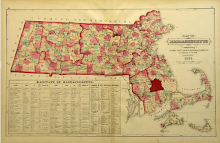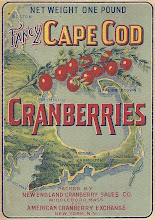
Cole writes in his introduction:
Driving back from Cape Cod into Plymouth County, taking nay exit will make its agricultural identity plain. Pickup trucks pass with license plates declaring this Cranberry Country.” The berry is so important to rural Carver that it appears on the town seal. A dirt road will inevitably lead to a bog, vast and rectangular or small and fitting the contours of the land. In this place, there were for years more acres of cranberry bogs than people. In the words of a Carver native, “Cranberries was all there was.”
In little more than a century, this diminutive fruit has forced those who would profit from it to become inventive and resourceful, to make for it a home, to protect it from wind and cold, and to fashion tools to tend and pick it. For some, the cranberry has provided a comfortable living for five generations, for others, only enough money to make it through each winter. When something so dominates the lives of people, it is worth knowing about.
And indeed Cole writes with much knowledge and skill, creating an intelligent and highly readable history. Chapters are devoted to the birth of the industry on Cape Cod and its expansion to Plymouth County, the early years of development, the wooden tools necessary for planting and harvesting, the Cape Verdean and Finnish immigrants who contributed to the evolution of cranberrying, the origin and growth of the cranberry cooperatives, the marketing of cranberries and the typical year of the cranberry grower. The work draws extensively upon archival sources (including the Middleborough Public Library’s Cranberry Collection) as well as interviews with individuals involved in cranberrying over the past decades.






















+of+Smoky+Mountains+018.jpg)
0 comments:
Post a Comment